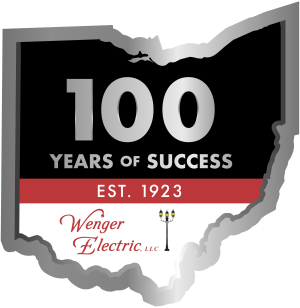How Much Does a House Generator Cost to Install?
A whole house generator isn’t something you think about too often, until you need it. When bad storms wipe out a stretch of power line and you’re suddenly thrust into darkness, that’s when you start to miss electricity. It’s also when many of us might start wishing we had a whole house generator. But is the cost prohibitively expensive? Read on to learn more.
Why Get a Whole House Generator?
While the short-term power outage can be an inconvenience for some, it can be life-threatening for others. If your livelihood, safety, or health depends on having constant access to electricity, then a whole house generator is the way to go. But if you’re only used to using portable generators, you might be asking yourself, “How much do standby generators cost, anyway?”
Let’s start with how they work. A whole house generator is permanently installed outside your home, just like your HVAC unit, and it can offer pretty much instant protection in the event of a power outage. If you opt for a manual switch, then it’s up to you to turn it on when the lights go out. The beauty of a standby generator is that your normal life doesn’t have to skip a beat, and you can opt for whichever level of power you prefer. If you run a business from your home, rely on medical devices and equipment, regularly experience extreme weather, live in a remote area, or depend on a sump pump during violent storms, a whole house generator is your best line of defense against a bad situation getting worse.
Home Generator Cost
As with any project out there, cost is highly dependent on a number of factors and your unique situation. National averages put home generator costs at around $9,500, with total project costs adding up to anywhere from $12,000 to $25,000. These are the most common things that will affect the cost of your whole house generator:
- Size: Higher capacity units will always cost more, but some may become more cost-effective the larger they are since the power yield increases exponentially. Typical sizing options are 12kWh, 14kWh, and 20kWh units. Buying the right size for your home and needs ensures that it won’t be strained by overuse but also means that you won’t pay for more capacity than you need.
- Fuel Type: Fuel source directly affects how much it costs to run and maintain the unit, since you need to have fuel on hand for regular testing and operation. The most common fuel types for whole house generators are liquid propane, diesel fuel, and natural gas. Units can range in price based on the type of fuel they use, with costs ranging from lows around $2,000-$6,000 (natural gas, propane) and generally topping out at around $10-$15,000 (diesel). Cost of the fuel itself will also come into focus when you need to run the unit during a prolonged power outage.
- Transfer Switch: Standby generators are most helpful when they automatically turn on, whether you are home or not. Manual transfer switches may be less expensive, but if you’re away when your home loses power, then the generator won’t be able to do its job. The technology in an automatic transfer switch is more advanced, which brings a higher cost, but they are worth the peace of mind and hands-off operation. For an electrician to install the switch you’ll also need to factor in labor costs, which could be as much as $1,200.
- Concrete Pad: A properly laid concrete pad is the most common choice in generator installation. It provides a level place for the unit to sit while reducing vibration, increasing airflow, and helping to prevent water damage. You will need to factor in the price of materials along with the labor needed to prepare the site, pour, and finish the concrete.
- Installation: Generator installation costs may be one flat fee for every aspect of the job, or they may be itemized and broken down into both materials and jobs, like site preparation, electrical work, general labor, installing a fuel storage tank, connecting to fuel lines, and more. Average costs can run anywhere from $500 to $5,000, and average about $2,000.
- Permits: Necessary permitting will depend on where you live and what exactly you’re having done. Expect to pay anywhere from $50 to $250 each.
- Optional Features: Wireless monitors allow you to oversee the unit’s operation remotely, and run about $200 to $400. You might also want to use a smart load manager to efficiently divide power between different zones in your home, allowing a smaller generator to work in a larger home. These devices can cost between $150 and $300.
Regardless of what brand, size, or fuel type you opt for, every whole house generator will require regular maintenance and testing. Running the unit for a few minutes each week will burn through fuel, but it could save you. If there is a problem brewing you’ll be able to get it taken care of right away and stay prepared for the next power outage.
Beyond weekly testing, you’ll also need to schedule annual maintenance by a certified technician, which will run from $80 to $300. All in all, you could be looking at spending about $200 to $600 each year on both maintenance and repair expenses for typical issues. Every homeowner will need to work through the specific expenses to know if installing a whole house generator is a worthwhile investment for them. Depending on your situation, the peace of mind that preparation can bring is often a valuable tradeoff.
So far, we haven’t named names. And some may wonder how much Generac generators cost, since this is a common brand on the market. Generac backup generators start just under $2,000, but their costs run just as high as any other brand of whole home generator. And of course you’ll need to tack on all the above-listed costs for a rough estimate of the total job. That said, at Wenger Electric we will always stand behind Kohler products as our brand of choice. They’ve been building quality generators for over 100 years and keep advancing to meet customers' needs.
For specific brand information or to get your own personalized quote for generator installation, please contact our team.
Get a Free Estimate
We maintain constant communication with our customers until the job is done. To get a free quote, or if you have any questions or special requests, drop us a line. We look forward to serving you!
For more information please fill out the form below.


